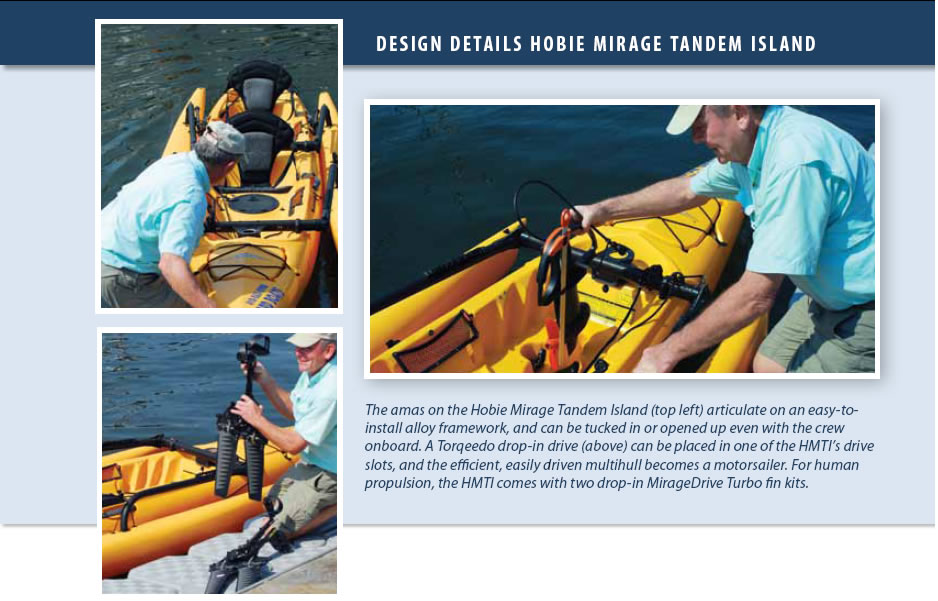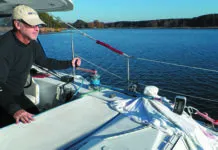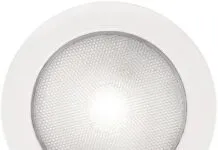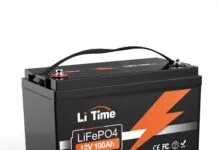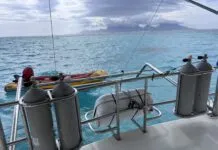
Photos by Ralph Naranjo
The Hobie Mirage Tandem Island, a mouthful we’ll refer to as the HMTI, is the latest incarnation of Hobie’s capable and creative engineering team. This triple-play trimaran can be paddled, pedaled, and sailed using dozens of Hobie’s in-house designed parts. A specialized Torqeedo electric outboard (www.torqeedo.com), which can be dropped into a drive slot, adds a forth dimension to this multi-tasking multihull. The Torqeedo comes complete with a remote battery and throttle control, and whether it’s used for mini-motorsailing, or for light tackle fishing by the angler who prefers to troll quietly and sail home—Hobie has hit the mark with this latest innovation.
As sailors skeptical of boats that try to offer too much of a good thing, we were a little concerned about the HMTI’s mega multitasking. We hoped it would prove to be a sequel to the woodworker’s Shopsmith, an elegant power tool that can be morphed from a table saw into seven different power tools.

At the heart of Hobie’s new sailing design is a ruggedly built, roto-molded, two-seat, sit-on-top kayak, a kayak concept that Hobie and many others have been building for a decade or so. Added to that foundation are two well-proportioned amas set on articulating crossmembers (akas), creating a very stable multihull platform. This mono-to-multihull transformation solves the righting moment requirement linked to sail carrying. A boomless roller-furling sail on a two-piece carbon-fiber spar that can be stepped as easily as a beach umbrella can be planted in the sand completes the sailing part of the package. The heel of the mast simply clicks into a deck-mounted receiver.
A double-ended mainsheet allows trimming at either cockpit location. The old who’s-the-sheet-hog rule prevails, and as with any double-ended sheeting arrangement, lines occasionally need to be reshuffled between the crew.
Steering is actuated via small levers situated on the sidedeck, to port of each seat well. These mini tillers work the opposite of a conventional tiller, but by reminding yourself to treat the lever like a wheel, the steering quickly becomes second nature.
Testers found the seats to be both comfortable and effectively located with all controls within easy reach. The centerboard has a simple lever-operated up-and-down control that retracts the foil completely for easy beaching.
Getting underway from a dock entails setting up the outboard ama ahead of time, and then, after a push away from the dock and a couple of either pedal cycles or paddle strokes, simply swinging the dockside ama into its place. Once both of the ama’s locking struts have been engaged, a tug of the sheet unfurls the sail and the usual trim-and-steer routine takes hold.


In 10 knots of breeze, the boat’s a blast to sail. Being so close to the water makes even modest boat speed exhilarating. The HMTI offers middle-of-the-fleet windward performance plus great reaching ability. It would be a stretch to call the HMTI an efficient light-air sailboat. However, among the fringe benefits of this multipurpose multihull are the mix-and-match propulsion modes. Sailors who want to work the quads a little while sailing can bolster light-air performance by pedaling the boat and increasing the airflow over the sail, creating a significant boost in boat speed. If you’re less inclined toward human propulsion, set the boat up with the Torqeedo outboard option, and the silent electric drive redefines the concept of motorsailing.
In truth, regardless of whether the amas are folded in, the HMTI is not a whole lot of fun to paddle when it’s decked out in sailing trimaran configuration. The increase in windage and wetted surface are just too much. But on days when kayaking is the goal, leave the mast, amas, and akas at home, and you’ll have a fun double kayak to paddle—a great way to explore an estuary or narrow river. Take along the Torqeedo if you want a break or if you want the ability to extend your exploration range. This is a versatile boat that seems to have a wide range of boating appeal, and it’s a prime example of electrical propulsion put to good use.
